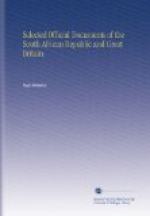“1st. The settlement of the boundary, especially on the western border of the Republic, in which the deputation eventually acquiesced only under the express conditions with which the Raad agree.
“2nd. The right of veto reserved to the British Crown upon treaties to be concluded by the Republic with foreign powers; and
“3rd. The settlement of the debt. Seeing, however, that in the said Convention of London considerable advantages are secured to the Republic, especially in the restoration of the country’s independence,
“Resolves, With acknowledgment of the generosity of Her Britannic Majesty, to ratify, as it hereby does, the said Convention of London.”
CHAPTER II.
CONSTITUTION OF THE SOUTH AFRICAN REPUBLIC.
ARTICLE 1.—This State shall bear the name of the South African Republic.
ARTICLE 2.—The form of government of this State shall be that of a republic.
ARTICLE 3.—It desires to be recognized and respected by the civilized world as an independent and free people.
ARTICLE 4.—The people seek for no extension of territory, and desire it only in accordance with just principles, when the interest of the Republic makes such extension desirable.
ARTICLE 5.—The people desire to retain and maintain their territory in South Africa unimpaired. The boundaries thereof are fixed by proclamation.
ARTICLE 6.—Its territory is open for every foreigner who obeys the laws of this Republic. All who are within the territory of this Republic have equal claims to protection of person and property.
ARTICLE 7.—The land or farms situate in this territory which have not yet been given out, are declared to be the property of the State.
ARTICLE 8.—The people claim the utmost social freedom, and expect the result from the maintenance of their religious belief, from the observance of their obligations, from submission to law, order and right, and the maintenance of the same.
The people permit the spread of the Gospel among the heathen under fixed precautions against deceit or misleading.
ARTICLE 9.—The people will not allow any equalization of the coloured inhabitants with the white.
ARTICLE 10.—The people will not suffer any slave trade or slavery in this Republic.
ARTICLE 11.—The people reserve to themselves the protection and defence of the independence and inviolability of the State, subject to the laws.
ARTICLE 12.—The people entrust the legislation to a Volksraad—the highest authority in the land—consisting of representatives or deputies of the people, chosen by the enfranchised burghers; but with the reservation that a period of three months shall be left to the people to enable them if they so wish to communicate to the Volksraad their verdict on a proposed law; except those laws which can suffer no delay.




